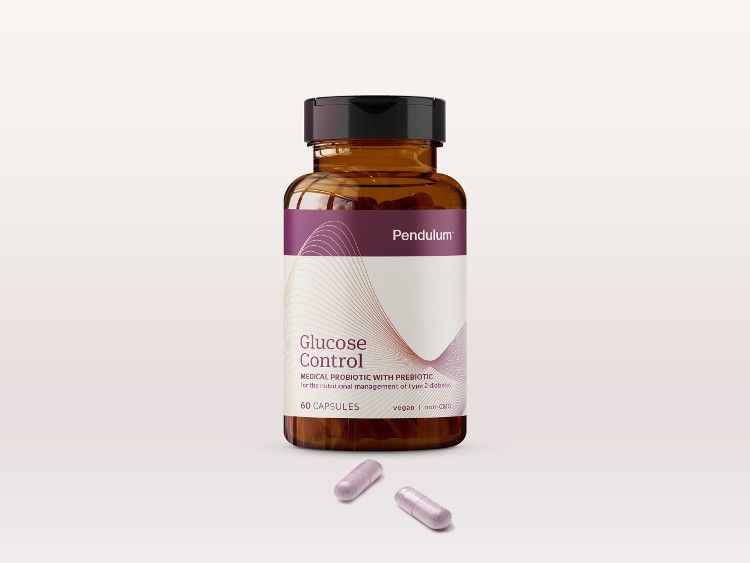Medical probiotic formula reduces glucose spikes and A1C, says recent study
A recent study found that supplementation with a novel medical probiotic called Pendulum Glucose Control improved A1C and reduced blood glucose spikes in subjects with type 2 diabetes.
Image courtesy of Pendulum Therapeutics

A recent study published in BMJ Open Diabetes Research & Care1 found that supplementation with a novel medical probiotic called Pendulum Glucose Control improved A1C and reduced blood glucose spikes in subjects with type 2 diabetes. In the multi-site, double-blinded, placebo-controlled, randomized study subjects were assigned to take either of two different probiotic formulas, or placebo for 12 weeks. One of the formulas contained colloidal silicon dioxide, inulin, Clostridium beijerinckii, Clostridium butyricum, Bifidobacterium infantis, while the other contained the same with the addition of Akkermansia muciniphila and Anaerobutyricum hallii. The latter was Pendulum Glucose Control.
Of the probiotic formulas ingested, it was found that only Pendulum Glucose Control showed significant improvement in primary endpoints of total glucose, and secondary endpoints of incremental glucose and A1C, compared to placebo. There were no detected changes in fasting glucose concentrations, indicating that the improvements in glycemic control from the probiotic formula appears to be driven by a reduction in plasma glucose concentrations during the postprandial period.
"The research demonstrates that the administration of microbial species, selected for their known beneficial functions in the microbiome, is a promising new tool that augments the traditional dietary measures for improving glucose control in type 2 diabetes, and it is well established that improved glucose control reduces the risk for the devastating long-term complications of diabetes," said Orville Kolterman, MD, chief medical officer, Pendulum Therapeutics, and senior author of the study, in a press release. The synbiotic blend of inulin and probiotics in Pendulum Glucose Control is designed to replenish the loss of function in the gut microbiome in people with type 2 diabetes by helping to metabolize fiber and produce butyrate, a short-chain fatty acid that helps stimulate the release of a hormore called GLP-1, known to decrease post-meal glucose spikes and A1C.
Reference
- Perraudeau F et al. “Improvements to postprandial glucose control in subjects with type 2 diabetes: a multicenter, double blind, randomized placebo-controlled trial of a novel probiotic formulation.” BMJ Open Diabetes Research & Care, vol. 8, no. 1 (2020)